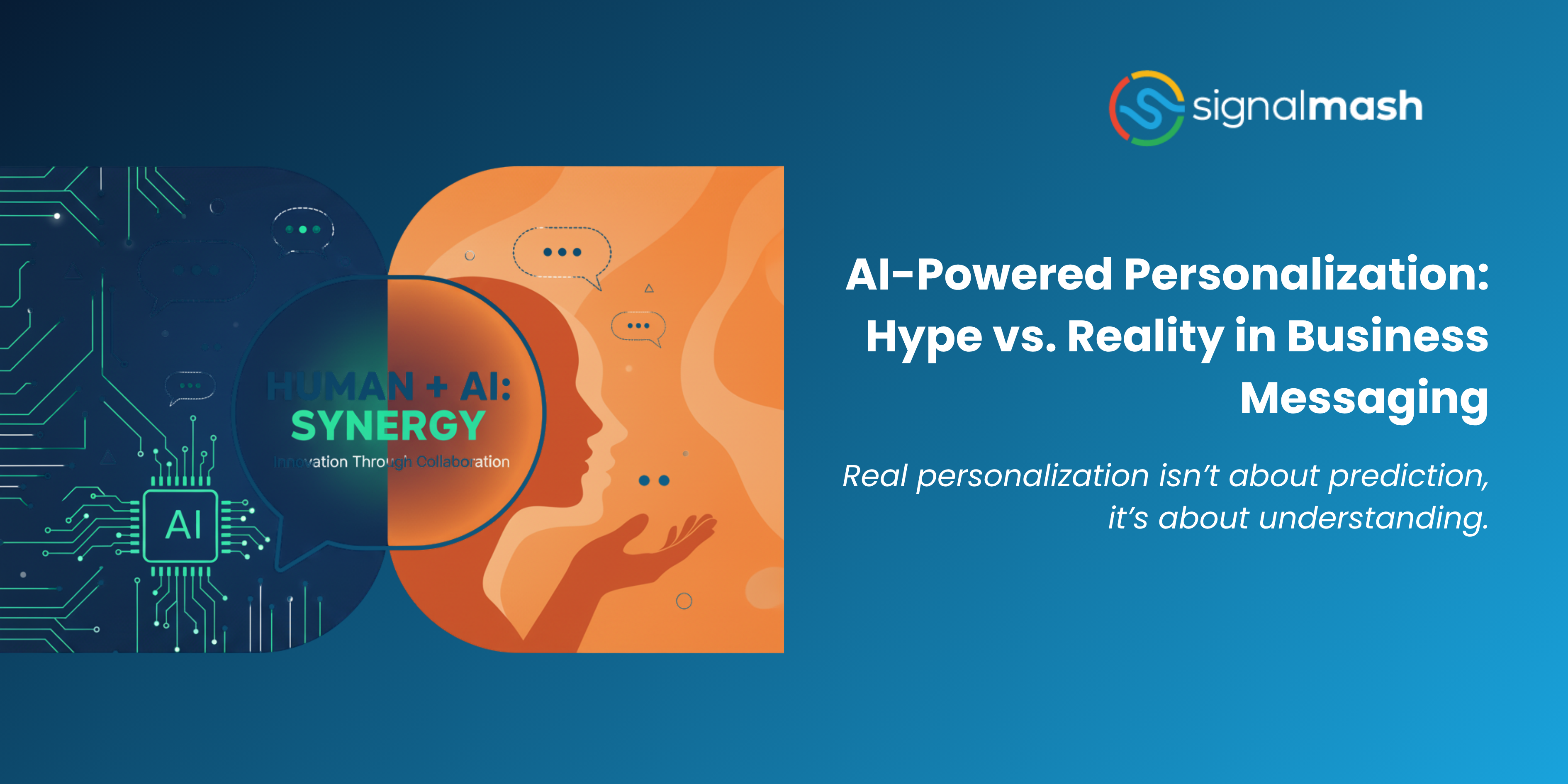
Date:
October 30, 2025
Category:
AI-Powered Personalization: Hype vs. Reality in Business Messaging
You’ve seen the claims: “AI personalizes every conversation.”
In practice, most of those “personalized” texts still sound like they were written for everyone and no one at the same time.
Businesses are learning that AI-powered personalization isn’t just about adding a first name to a message or segmenting by ZIP code. Real personalization means relevance, sending a message that fits the customer’s intent, timing, and trust expectations. And that’s where many AI-driven systems fall short.
When “Personalized” Feels Robotic
Consumers are more sensitive than ever to messaging tone. They can instantly tell when a message is machine-generated or when it lacks genuine context. The problem isn’t the technology, it's how it’s used.
AI tools can analyze data and predict customer behavior, but without compliant data practices and ethical messaging frameworks, personalization quickly crosses into privacy risk. For brands that rely on SMS and MMS messaging, this becomes a high-stakes issue.
Carriers are now flagging messages that overuse behavioral triggers or appear to be “hyper-personalized” based on inferred data. The intent might be to engage, but the outcome can be a compliance violation.
The Reality: Data Quality and Consent Drive Trust
Personalization works when it’s built on clean, transparent data. That starts with consent. Customers expect clarity on why they are receiving messages and how their data is being used.
The FCC and CTIA continue to tighten standards for 10DLC registration, opt-in disclosure, and data usage in automated messaging. AI models that analyze message engagement or click behavior must align with those same principles.
In short, AI can help you send smarter messages, but it cannot repair a weak compliance foundation. Trust is earned through clear opt-ins, verified sender IDs, and consistent message quality.
What Actually Works in AI-Driven Personalization
After reviewing recent campaigns across industries, a few strategies consistently stand out:
- Micro-segmentation with human review. Use AI to group audiences by behavior, but always have human oversight to ensure relevance and compliance.
- Predictive timing, not overreach. Sending at the right time based on engagement data improves results more than over-customizing content.
- Message tone testing. Use AI to test variations for readability and tone instead of rewriting entire messages.
- Opt-in reaffirmation. Periodically confirm consent with subscribers. This small step signals respect and builds long-term trust.
These practices strike a balance between automation and authenticity. The brands that excel in personalization don’t chase AI trends; they pair automation with accountability.
Where AI Meets Messaging Compliance
Machine learning is now being used not only for personalization but also for carrier-level spam detection. That means your “personalized” campaign might be scored by the same AI systems carriers use to block spam. The overlap between these technologies makes compliance expertise more critical than ever. Signalmash helps businesses navigate this intersection by pre-vetting templates, managing TCR registration, and ensuring AI-personalized content meets carrier standards before it goes live.
Personalization Without Compromise
AI can make communication more efficient, but it’s human judgment that makes it meaningful. Customers want relevant conversations, not predictive ones. Signalmash supports that balance through direct carrier relationships, proactive compliance management, and transparent processes that protect your brand while improving message performance. If you want to ensure your personalized SMS and MMS campaigns stay trusted, compliant, and effective, request a personalization and compliance review with Signalmash today.
Visit signalmash.com to schedule your review.
Tags:
AI
Business
Text Messaging
Technology

Hi! I’m one of The Mashers at Signalmash
If you want to discuss your SMS & voice needs, we’re available! Use the form below to leave your details or set a 15 min call.


